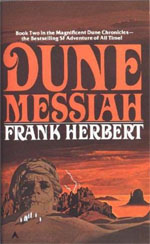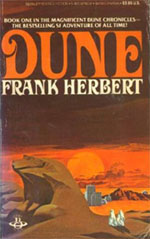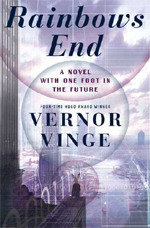The following reaction will contain spoilers for both Dune and Dune Messiah. As a policy, I’m trying to keep the spoilers in What I’m Reading reactions to a bare minimum and limited to the first fifty pages of the book. If the spoilers exceed those guidelines, I’ll make a point to include a note up front.
DUNE MESSIAH
From a certain point of view, Dune Messiah is a disappointment: It simply doesn’t live up to the incredibly high standard set by Dune itself.
Some of the problems with Dune Messiah are failures in the basic craft of storytelling; flaws which would be notable in any work. For example, there are far too many scenes – particularly in the first half of the novel – which are told in flashback or exposition instead of being shown. One is often left with the feeling that Herbert just didn’t quite feel up to the challenge of telling the story to be found in those scenes.
This central flaw, in fact, contributes to many of the problems in Dune Messiah. For example, the stellar character conflicts of Dune are notably blunted in Dune Messiah… often because key components of those dramas are ignored or elided over. For example, there is a cold war tension between Chani and Irulan which begins to flare into open conflict at the beginning of the novel. But then the resolution of that interplay is simply shoved off-screen and then cursorily resolved in an almost incidental and completely off-hand fashion. (And this despite the fact that its resolution is absolutely pivotal in setting up the novel’s conclusion.)
What ultimately keeps Dune Messiah from achieving the true status of classic is that it fails to find that precious gestalt of Dune: Where Dune operated on many different levels at once, Dune Messiah is stripped down to a far simpler dynamic. Elements of the political thriller, character drama, and high tragedy remain… but Herbert can’t quite seem to keep all the balls in the air.
For one example, let us consider the tragic grandeur of Yueh’s betrayal in Dune. Herbert almost manages to capture the dynamic of high tragedy once again in his portrayal of Paul’s prescient vision turned to bane. Paul, trapped by the inexorable fate seen within his prescient vision and bound by the irresistible momentum of the race consciousness lying behind the Jihad carried out in his name, has all the makings of such a tragedy. But Herbert lets it slip through his fingers: The prescience itself, although brilliantly handled in many respects (such as the scene where Paul must let a doom befall himself in order to find a greater good), also ends up denying some of the central necessities of true tragedy.
I also think that Dune Messiah is a difficult story specifically because it ties Paul in those chains. I think a lot of people (myself included) read the end of Dune as a triumph… and Dune Messiah makes it explicit that Paul failed and failed badly. That’s a tough pill to swallow. I know it’s what made me put the book down the first time I tried reading through the Dune saga: It wasn’t the sequel I had written in my own head. I wanted the Messiah Triumphant and I got something akin to the False God’s Fall.
With all that being said, I would be seriously remiss in ignoring the strengths of Dune Messiah, particularly in the book’s second half: Duncan Idaho’s personal struggle is a very powerful and well-handled piece of characterization. Paul’s manipulation of his prescient vision — his constant struggle to find the slightest loophole through which to escape the chains of his own future — is often powerfully dramatic. And there’s also some great expansion done on the nifty, sensawunda stuff, along with the depth and unique feel of the Dune universe (Tleilaxu face dancers, for example).
But, with that being said, I would still love to read a version of Dune Messiah in which Herbert managed to:
(1) Avoid the storytelling errors in the first half.
(2) Expand Alia’s personal drama (something which would have also added a great deal of depth to Children of Dune).
(3) Let the Chani and Irulan conflict play out with the type of detailed political intrigue that he displayed himself fully capable of in Dune.
(4) Communicate the by-play of the mutual and interacting betrayals between the conspirators (and let more of those by-plays and betrayals play themselves out).
(5) Handle the framing devices of the story better.
In short, Dune Messiah reads like a rushed novel. There’s a lot of potential in the basic structure of the story, but little or none of it is realized in actual practice. Perhaps if Herbert had taken the time to develop the novel more fully, we might have gotten a work that would stand up better in the inevitable comparison to its predecessor.
GRADE: B-
Frank Herbert
Published: 1969
Publisher: Ace
Cover Price: $7.99
ISBN: 0441172695
Buy Now!














